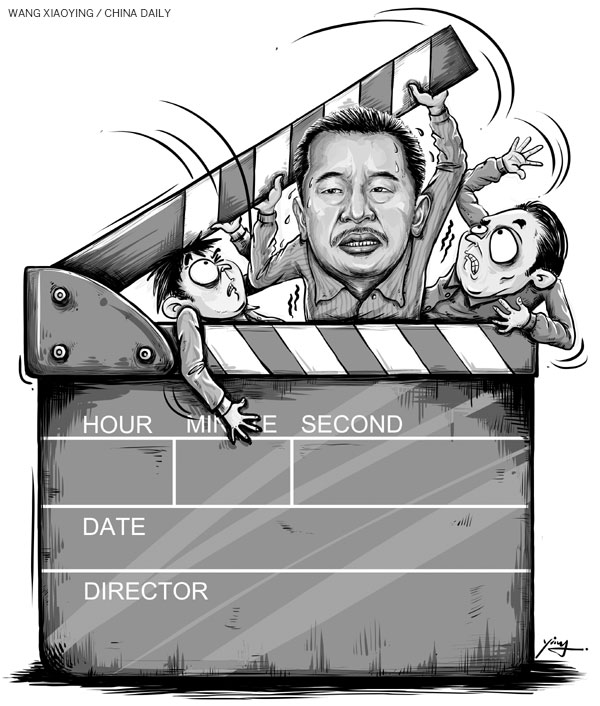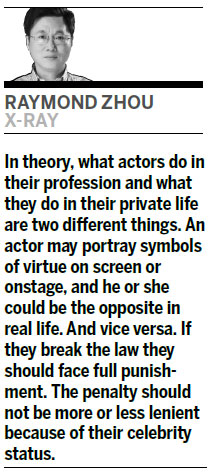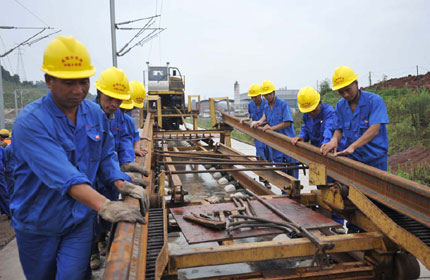Matter of honor and duty to care
Updated: 2014-06-21 07:18
By Raymond Zhou (China Daily)
|
|||||||||||
When a celebrity actor is caught with his pants down, he may see his career crumbling even though a tidal wave of cynical sympathy purports to buttress him up.
The conspicuous absence of any mention of a nominated film at a news conference for the 17th Shanghai International Film Festival made headlines across the nation.
Uncle Victory is in the lineup of films for the Golden Goblet Award, yet when jury president Gong Li introduced the nominees, it was not even mentioned. The media pushed for an explanation, and the event folded before it ran its course.

The most likely reason for the lapse, so goes the argument, is the star of the film. Huang Haibo was recently arrested for hiring prostitutes and has been sentenced to six months' detention. Had the festival organizers been able to pull the entry from the lineup, I'd say they would have done that to avoid unnecessary attention.
Huang is a 37-year-old actor who has made a specialty out of playing nice and honest guys. While the scandal shook the nation, much of the online feedback was forgiving, citing his bachelor status as an excuse for his act. Many were also shocked that he did not pick one of the starlets or groupies that tend to surround not ables like him. That would not have been illegal but morally problematic for some netizens.
The reaction was in stark contrast with the revelation of Wen Zhang, another popular actor with a public persona of simple honesty, cheating on his wife. That time the backlash was swift and brutal and Wen had to apologize profusely.
However, Wen was carrying on an illicit affair with a consenting adult where as Huang broke Chinese law. Which of these two would get a harsher penalty in the court of public opinion? Some even joked that given the unexpected avalanche of publicity Huang could sell out anything he stars in.
The reality is much more sobering and somber. With Huang in detention, the television project in which he was playing the male lead had to be put on hold. The investors seem to be vacillating. They probably have not figured out whether it would cost them more to keep the production or to junk it.
Legally they could sue him for damages that amount to twice the fee they paid him for the role. Even so, they appear to be stuck in a lose-lose situation.

What if regulators place an official or unofficial ban on any work Huang is involved with, finished either before or after the scandal? They could cite the impact on public morals as a justification.
What if buyers, mainly State-owned television stations, shy away from his work for fear of inciting unnecessary controversy? There is a glut of TV drama in the marketplace anyway and they can afford to be choosy.
What if audience members, now that the veil of illusion is lifted, can-not accept him as a screen hero any-more? The public is fickle, they adore you today and may desert you in a whim, let alone in the aftermath of a crushing incident like this.
In theory, what actors do in their profession and what they do in their private life are two different things. An actor may portray symbols of virtue on screen or on stage, and he or she could be the opposite in real life. And vice versa. If they break the law they should face full punishment. The penalty should not be more or less lenient because of their celebrity status.
But the court of public opinion does not function in a void. Actors build up their public image more from their roles than from who they are as a private citizen.
As they draw direct and tangible benefits from this image, they have a responsibility to protect it as part of their intangible assets. If they fail to do so, they suffer the consequences that often go beyond monetary losses.
While public awareness needs to be raised on the difference between who actors are and who they project to be, there is an implicit pact between them and the public that they must honor. It is not an issue within the legal realm. But it exists regardless. Many careers have been derailed as a result of personal scandals.
Li Daimo, the young singer who emerged from a hit TV contest, was sentenced to nine months' jail for hosting a drug-taking party and saw his budding career evaporate.
After the screen icon Liu Xiaoqing was released from a year of detention, during which time charges of tax evasion were investigated but no charges laid, she shifted her career from high octane to the slow lane, playing mostly supporting roles afterwards. Worse than that, she no longer occupied the front pages of tabloids unlike the 1990s when she made news almost weekly.
It is probably better to let the market decide the exact fallout from celebrity scandals. When a Hong Kong film actor offended a large swathe of mainland netizens, they called a boycott of his new movies, and his two recent releases ended up with dismal box-office grosses.
Had the government stepped in, it would have been apolitical incident with inevitable negative repercussions. Likewise, it would be on shaky legal ground if regulators pushed for a ban, no matter how temporary, on Huang Haibo's film or television work.
However, if producers and couch potatoes decide to reject Huang, it would be a different matter. They represent market forces and who can argue with them in a market economy, even an imperfect one? They may prod him to take on less than positive roles.
They may forget about the incident when news candals break out, as is so often the case. Some cynics have even predicted he may even try to cash in on his newly gained notoriety, although I think that is unlikely.
The incident probably said more about the changing mores of a nation in transition than an individual caught fooling around. As in most countries, China has a wide spectrum of attitudes toward sexual activities such as prostitution, ranging from calling for legalization to utter rejection as moral degradation. Only when a personage like Huang is involved does it turn into a circus act.
Coincidentally, Hugh Grant, who was one of the featured luminaries for this year's Shanghai Film Festival, was caught in a similar act in 1995 while he was in Los Angeles.
Not only did he have a healthy public image, but he had a beautiful partner at home. People simply could not understand his predilection. Yet, after an appearance on a late-night talk show, in which he offered no excuses, he was largely forgiven and his career went on seemingly unaffected by it.
No one knows how long the wind will blow over Huang's head, or if everything will be restored to its original order. We live in a world where pristine views are constantly challenged and uncomfortable realities surface ever so often.
Many have adjusted their attitudes due to multiple factors. The fact that Huang is a popular actor is not the only one, not anymore.
Contact the writer at raymondzhou@chinadaily.com.cn
(China Daily 06/21/2014 page11)
Today's Top News
China, Germany join hands to drive growth
Meet foreigner breed of workers
Product placement deal backfires
From Westlife to the East
Gambling costs World Cup fans their lives
US supports Ukraine's decision to suspend ceasefire
It's all about making a spectacle
China likely to see 7.5% growth in second quarter
Hot Topics
Lunar probe , China growth forecasts, Emission rules get tougher, China seen through 'colored lens', International board,
Editor's Picks

|

|

|

|

|

|





